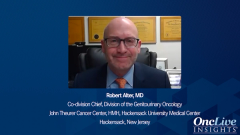
Using Cabozantinib + Nivolumab to Treat Advanced Renal Cell Carcinoma
A discussion on the use of cabozantinib-nivolumab for the treatment of advanced renal cell carcinoma.
Episodes in this series

Arnab Basu, MD: Could you explain your decision-making process in choosing cabozantinib-nivolumab for this patient?
Shawnta Anakwah, MD: This patient was older. He didn’t have a lot of bulky disease, just the nonspecific mediastinal lymphadenopathy. This guy has psoriasis, so that would be a concern with choosing dual I/O [immune-oncology] therapy with him flaring up. The decision was made to do cabozantinib-nivolumab on him.
Arnab Basu, MD: That makes a lot of sense. Thank you. When you use cabozantinib-nivolumab in your practice, are there common adverse events that occur more frequently with this regimen?
Shawnta Anakwah, MD: Blood pressure—hypertension is definitely a common 1. I’ve seen some diarrhea as well as stomatitis. I’ve just treated symptom based. With those interruptions first, I treat symptom based, and all my patients have done very well. I’ve been able to continue treatment.
Dr Basu, what’s been your experience with the cabozantinib-nivolumab combination in your practice?
Arnab Basu, MD: I’ve had a good experience with cabozantinib-nivolumab. It’s a very well tolerated regimen. There are published data for cabozantinib-nivolumab compared with sunitinib in terms of FKSI-17 [Functional Assessment of Cancer Therapy–Kidney Symptom Index] quality-of -life measures, and cabozantinib-nivolumab performs very differently in those. The fact that we start with a 40-mg dose of cabozantinib is really good—it’s a sweet spot for a cabozantinib dose in most patients. I’ve found it to be well tolerated to start with. But I agree, the issues that occur tend to be hypertension, occasional diarrhea, and some upper–GI [gastrointestinal] adverse effects, as well with a lot of GERD [gastroesophageal reflux disease] and GI irritation adverse effects. Otherwise, patients tolerated well at the 40-mg dosing.
Transcript edited for clarity.










































